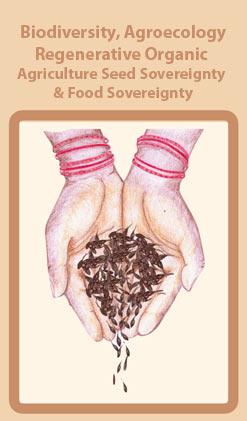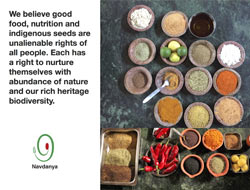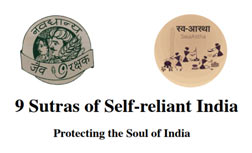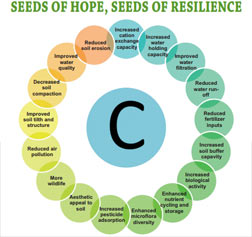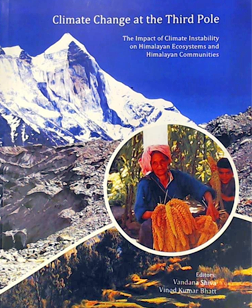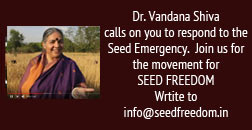Social Scientists, Experts and Adivasi representatives depose before the Jury;
Testimonies on Land Grab and Government/Corporate Atrocities in Jharkhand and West Bengal
A poignant session (9.4.2010) on Chhattisgarh and the situation of adivasis was presented at the Independent Peoples Tribunal on Land Acquisition, Resource Grab and Operation Green Hunt on 9.4.2010. This was followed by a second session focusing on two other states (where the Operation Green Hunt has recently commenced) with presentations and depositions on 10.4.2010. Speakers from Jharkhand and Orissa testified on numerous violations of laws, relating to land acquisition, tribal protection, pollution, and other violations of the Indian Constitution by corporations and the state governments.
At the Jharkhand session, several eminent speakers, including academics and leaders of popular resistance movements spoke about the situation of displacement, resistance and the looming threat of Operation Green Hunt recently commenced in Jharkhand as well. Prem Verma, spoke about the strength of the movements that have powerful grassroots support and have been largely successful in their struggles to keep their land.
Dr. Alex Ekka, spoke on the umbilical relationship between tribals and their forests. He said: “Our worldview is cosmocentric. Every being has a place in this worldview, whether it is a rock, a bird, or a person. This is the worldview that will lead to a sustainable and peaceful life on what we adivasis call our Mother Earth.”
James Topo spoke emphatically on the pathetic state of education in tribal areas. The content of textbooks is completely irrelevant to the needs and context of adivasi children with the content-writers unable or unwilling to grasp that difference. The failure of education is exploited by officials; an example was given of a land acquisition officer giving a cheque to a tribal, assuring him that it was only a record of their conversation.
Gladson Dungdung, a tribal rights activist spoke on the atrocities on civilians in the name of Operation Green Hunt in Jharkhand since March 2010. Adivasis in the area are experiencing this operation in the form of harassment, detention, looting and beating. The result, as it is being manifested now, and only likely to grow, is that the village economy has ground to a complete halt, threatening the delicate balance of sustenance on which the adivasis survive. Fear has set it, villagers are unwilling to go into the forest to collect minor forest produce, rural markets are empty and all democratic space for protest has been closed to the adivasis. Migration out of the forest has commenced. Gladson Dungdung stated: “Operation Green Hunt is not for cleansing Maoists but for establishing corporate houses in the mineral corridor, which was labeled the Red corridor only after the State realized that corporations were not signing MoUs for certain areas where protest was likely. The adivasis will never give their land – we tell the steel corporations that we don't want to eat steel, we want to eat foodgrains.”
Dr. Bani of the Azadi Bachao Andolan spoke of the many hurdles faced in the successful struggle to stop the huge NTPC thermal power plant, which would have ruined thousands of acres of prime agricultural land. Most members of the Andolan have at least 10 false cases booked and pending against them. He spoke of the farce that is the public hearing for approval of projects. Hearings scheduled say, for 6th April at a distance of 20 km from the site of construction (in violation of the law) get secretively held on the 5th April, 11pm, to dissuade people from attending and participating (sited from a real 2009 incident).
Dr Bani also mentioned demonstrated alternatives to power production (touted as a mode of development) for example, where the government wants to buy land with mineral resources worth 40-60 crore/acre for a pittance from farmers, ABA have instead started small power plants, fully owned by the villagers, which utilize the local coal resources to power 50-60 households and all revenues would be split evenly between the villagers. He stressed on importance of development that was locally imagined and with locals benefitting and deciding on operations and economics.
Radha Krishna Munda of the Jharkhand Jungle Bachao Andolan spoke of ground realities in the implementation (or lack thereof) of the Forest Rights Act in Jharkhand. Additionally he talked of the harassment that adivasis and popular movements are facing. “An atmosphere of suspicion and intimidation has been created” he said – instead of implementing the Forest Rights Act, the nexus of police, civil administration and Forest Department is actively conniving with corporations to illegally give away adivasi land.
The West Bengal session saw a re-presentation of protests and peoples movements consistently dubbed Maoist in the past, Lalgarh being an example. Local activists and leaders of peoples' movements are being branded as Maoists, a common thread that was also seen in the testimonies from Jharkhand and Chhattisgarh. Sujato Bhadro talked about the grave situation in Lalgarh, where a day after the Chief Ministers convoy was blown up, the police attacked villages 40 km away and mistreated the villagers. A village woman’s eyes were brutally gorged in the attack, another miscarried her baby. Currently, joint forces in the “affected areas” run amok, in violation of Constitution of India and international norms to which India is a signatory. People are being abducted, not produced in 24 hours and night raids are being conducted. In an unprecedented move, the entire area of Lalgarh has been governed under Section 144 of the CRPC since 17th June 2009.
Anup Mandal, a marathon runner at the national level, spoke of being beaten by the police despite protesting about his lack of any Maoist connection and had to be recognised and rescued by a journalist after considerable damage. He was confined to bed for 4 months, putting an end to his dreams of competing at the international level. He said: “I want the SP to be held responsible; as it was due to him that my life was ruined.”
Montu Lal and Gajen Singh, activists, also testified on atrocities in Lalgarh. Government has set aside funds for Joint Forces and for the Harmat Vahini but there is no funding for the poor. People have evacuated the villages and the paramilitary forces have taken measures that seem to be designed to take vengeance on people – such as polluting village wells and forcibly recruit people for petty work. “It feels like these are actions of a foreign occupying force”.
The Independent People’s Tribunal will continue from 9th – 11th April, 2010, at the Constitution Club, New Delhi. This is organized by a collective of civil society groups, social movements, activists, academics and concerned citizens in the country.


